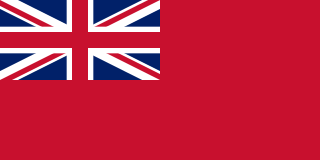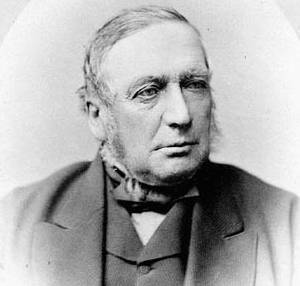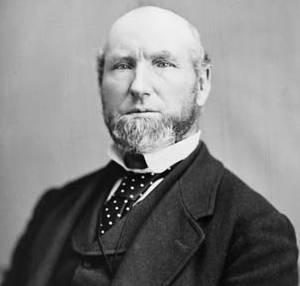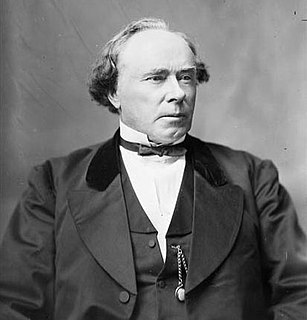The Hon.
Samuel Sylvester Mills |
|---|
|
| Senator for Ontario |
|---|
In office
October 23, 1867 –January 24, 1874 |
| Appointed by | Royal Proclamation |
|---|
| Member of the Legislative Council of the Province of Canada |
|---|
In office
1849–1867 |
|
| Personal details |
|---|
| Born | (1806-12-01)December 1, 1806
Hamilton, Upper Canada |
|---|
| Died | January 24, 1874(1874-01-24) (aged 67)
Hamilton, Ontario |
|---|
| Political party | Conservative |
|---|
Samuel Sylvester Mills (December 1, 1806 – January 24, 1874) was a Canadian businessman and politician.
He was born in Burlington Bay, later Hamilton, in Upper Canada in 1806. He went into the business of selling hardware, also expanding into shipping, construction, mills and real estate, and quickly became one of the richest people in the area at the time. He served on the town council for Hamilton. Mills also served as president of the Gore Bank. In 1849, he was appointed to the Legislative Council of the Province of Canada. At Confederation in 1867, he was appointed to the Senate of Canada. He died while still in office at Hamilton in 1874.

Hamilton is a port city in the Canadian province of Ontario. An industrialized city in the Golden Horseshoe at the west end of Lake Ontario, Hamilton has a population of 536,917, and a metropolitan population of 747,545. The city is located about 60 km southwest of Toronto, with which the Greater Toronto and Hamilton Area (GTHA) is formed.

The Province of Upper Canada was a part of British Canada established in 1791 by the Kingdom of Great Britain, to govern the central third of the lands in British North America, formerly part of the Province of Quebec since 1763. Upper Canada included all of modern-day Southern Ontario and all those areas of Northern Ontario in the Pays d'en Haut which had formed part of New France, essentially the watersheds of the Ottawa River or Lakes Huron and Superior, excluding any lands within the watershed of Hudson Bay. The "upper" prefix in the name reflects its geographic position along the Great Lakes, mostly above the headwaters of the Saint Lawrence River, contrasted with Lower Canada to the northeast.
The Legislative Council of the Province of Canada was the upper house for the Province of Canada, which consisted of the former provinces of Lower Canada, then known as Canada East and later the province of Quebec, and Upper Canada, then known as Canada West and later the province of Ontario. It was created by The Union Act of 1840.
He donated land to the city of Hamilton for use as a cemetery, which later became part of Harvey Park.
This page is based on this
Wikipedia article Text is available under the
CC BY-SA 4.0 license; additional terms may apply.
Images, videos and audio are available under their respective licenses.

Samuel Bois Smith was a Loyalist British Army officer and politician. He was appointed to the Executive Council of Upper Canada and appointed Administrator of Upper Canada.

John Hamilton Gray, was a politician in the Province of New Brunswick, Canada, a jurist, and one of the Fathers of Confederation. He should not be confused with John Hamilton Gray, a Prince Edward Island politician in the same era.

Andrew Trew Wood was a Canadian businessman and parliamentarian.
William Dickson was a businessman, lawyer and political figure in Upper Canada.
Richard Beasley was a soldier, political figure, farmer and businessman in Upper Canada.
William Robertson was a businessman and political figure in Upper Canada.
Zacheus Burnham was a farmer, judge and political figure in Upper Canada.
Samuel Mills may refer to:

Malcolm Colin Cameron was a businessman and lawyer in Ontario, Canada. He represented Huron South in the House of Commons of Canada from 1867 to 1875 and from 1878 to 1882 and Huron West from 1882 to 1887, 1891 to 1892 and 1896 to 1898.

Thomas Mayne Daly was a businessman and political figure in Canada West. He represented the riding of Perth North in the House of Commons of Canada and Perth North in the Ontario Provincial Parliament.

Walter Hamilton Dickson was a lawyer and political figure in Canada West. He was a Conservative member of the Senate of Canada from 1867 to 1884.

Henry Corby was an Ontario businessman and political figure. He represented Hastings East in the Legislative Assembly of Ontario as a Conservative from 1867 to 1874.
Robert Nichol was a businessman, judge and political figure in Upper Canada.
Thomas Clark was a businessman and political figure in Upper Canada.

Thomas Rodman Merritt was a businessman and political figure in Upper Canada, later Ontario, Canada. He represented Lincoln in the House of Commons of Canada as a Liberal member from 1868 to 1874.
George Sylvester Tiffany (1805–1856) was a Canadian lawyer and politician. He was born in 1805 at Ancaster, Upper Canada. He married Eliza Anne Strange, and they had one son and four daughters. He was mayor of Hamilton, Ontario in 1848 and died in 1856. He is buried at St. John's Anglican Churchyard in Ancaster.

Gilbert McMicken was a Canadian businessman and political figure. He served on the Council of Keewatin the governing body of the District of Keewatin from 1876 to 1877.
Hamilton Hartley Killaly was a civil engineer and political figure in Canada West.

James Norris was an Ontario businessman and political figure. He represented Lincoln in the House of Commons of Canada as a Liberal member from 1874 to 1878.

William Gibson was a Canadian politician.












